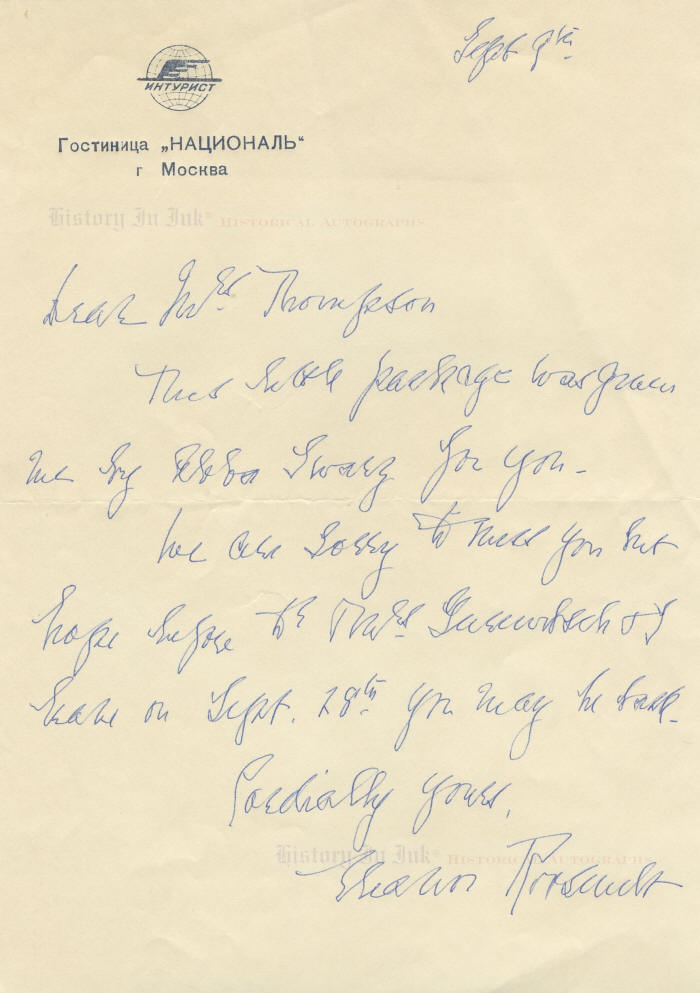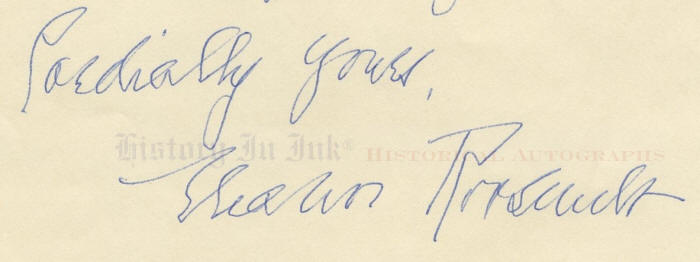

1403328
Eleanor Roosevelt
Scroll down to see images of the item below the description
From the Estate of Llewellyn E. Thompson,
United States Ambassador to the Soviet Union
“We are sorry to miss you but hope before . . . I have to leave . . . you may be back."
Anna Eleanor Roosevelt, 1884-1962. First Lady of the United States, 1933-1945. Autograph Letter Signed, Eleanor Roosevelt, one page, 5¾" x 8¼", on stationery of the National Hotel, Moscow, [U.S.S.R.], September 9, no year [1957].
The former First Lady passes along a gift to Jane Thompson, the wife of Ambassador Llewellyn E. Thompson, and expresses regret that she missed her in Moscow. In full: “This little package was given me by Ebba Swarz for you. / We are sorry to miss you but hope before Dr. David Gurewitsch & I have to leave on Sept. 28th you may be back. / Cordially yours . . . .”
Mrs. Roosevelt was finally able to tour the Soviet Union in 1957. Ideological tension—the Cold War—had intervened during the 12 years since the end of World War II, when the Americans and the Soviets had been allies. The Soviet Union's development of its own atomic bomb, which fueled an arms race, and American leadership against communist aggression in Korea only made the Cold War colder. The death of Soviet Premier Josef Stalin in March 1953 and the Korean armistice later that summer cooled tensions somewhat, however, as a new regime took control in the Soviet Union. The “Big Four" summit in Geneva, Switzerland, in 1955, at which President Dwight D. Eisenhower and Soviet Premier Nikolai A. Bulganin and de facto Soviet leader Nikita Khrushchev were the principal players, gave reason for optimism that the Cold War would thaw with cooperation between the Western democracies and the Eastern Communist block.
Yet when Mrs. Roosevelt planned to tour the Soviet Union in 1954, in order to write about it in her syndicated newspaper column “My Day,” she cancelled the trip the day she was scheduled to leave because the Soviet government denied visas to her translator and the other journalist traveling with her. She complained that the Soviet government seemed afraid of more interaction with the outside world.
Her opportunity came again in 1957 when the U.S. State Department denied her a travel visa to visit communist China. She traveled with her secretary, Maureen Corr, and her friend and personal physician, Dr. A. David Gurewitsch, who spoke fluent Russian, and his wife Edna. The group visited Moscow, where they saw the circus and the ballet, and Leningrad, Zagorsk, Taskent, Samarkland, Sochi, and Yalta, where President Franklin D. Roosevelt had met with Stalin and British Prime Minister Winston Churchill in February 1945. Mrs. Roosevelt wanted to see everyday life, and she toured schools, churches, mosques, factories, hospitals, and a state farm. But she complained that the Soviets tightly controlled what she saw. Still, she saw long lines at grocery stores and signs of poverty. Soviet life and Soviet ideology, she said, were a “mass of contradictions."
Mrs. Roosevelt spent 2½ hours interviewing Khrushchev. In the wake of the Soviet Union's military suppression of the Hungarian Revolution in late 1956, the discussion was chilly—and indeed Mrs. Roosevelt did not know until the last minute whether Khrushchev would even see her. The two debated ideology and foreign policy, and Mrs. Roosevelt ultimately told her readers that the American-Soviet relationship required “understanding on our part, respect for [Soviet] achievements, but a firmer belief in the possibilities of our own system." After the recording stopped, in response to Khrushchev's question whether he could tell Soviet newspapers that the conversation had been friendly, Mrs. Roosevelt said that he could say “that we have had a friendly conversation but that we differ." Laughing, Khrushchev said, “At least we didn't shoot each other!"
After returning to the United States, Mrs. Roosevelt sought to increase travel between the two countries. She told readers that she hoped “for the sake of our country and our people" that she could “make you see the reasons why our misunderstandings are so great, and some of the things we must do if war and extermination are not to be the answer for both the people of the U.S. and the people of the Soviet Union." She returned to the Soviet Union herself in September 1958, and Khrushchev visited her twice in the United States.
Ambassador Thompson (1904-1972) was a career American diplomat who served at a critical time in history as the United States Ambassador to the Soviet Union under Presidents Eisenhower, John F. Kennedy, and Lyndon B. Johnson. Thompson joined the Foreign Service in 1928, and during his long and distinguished career he served as the United States Ambassador to Austria from 1955 to 1957. Eisenhower appointed Thompson Ambassador to the Soviet Union in 1957, and Kennedy reappointed him in 1961. He resigned in 1962, but Johnson reappointed him in 1967, and he served until 1969. He also held the posts of Career Ambassador and Ambassador At Large. He was part of the Executive Committee of the National Security Council, or ExComm, which advised Kennedy during the Cuban Missile Crisis in 1962, and he was present at Johnson's summit with Soviet Premier Alexei Kosygin at Glassboro, New Jersey, in 1967. He came out of retirement to advise President Richard Nixon on the Strategic Arms Limitation Treaty (SALT) negotiations with the Soviet Union and to serve as a member of the United States delegation to the SALT talks from 1969 until his death in 1972.
This letter is an excellent example of Mrs. Roosevelt's difficult handwriting. It has one horizontal mailing fold and two diagonal folds that pass between “Eleanor" and “Roosevelt" but mostly affect blank areas. Overall it is in fine condition. It comes with a photograph of Mrs. Roosevelt at President Roosevelt's grave at Hyde Park, New York, accompanied by Premier and Mrs. Khrushchev and Soviet Foreign Minister Andrei Gromyko.
Provenance: This letter comes directly from the Thompson estate. It has never been offered on the autograph market before.
Unframed.
_____________
This item has been sold, but
click here to see other
Presidents and First Ladies items
that we are offering.



